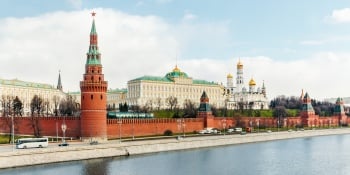Published: 19.04.2024

Although Russia exerts real and dangerous influence in the West, the traditional conservative Right is nevertheless being falsely accused of pro-Moscow activities. Among the methods most commonly used are:
● creating the impression that the Right wing has some kind of secret business or social contacts with Kremlin representatives;
● suggesting that Moscow, via an intricate network of interdependent organisations, is funding global conservatism;
● promoting the thesis that since Putin and European conservative activists have similar views on the cultural revolution, it means that the Kremlin controls these activists;
● arguing that the electoral successes of Right-wing parties are largely the result of the efforts of Moscow’s internet trolls;
● exploiting the fact that some conservatives indeed facilitate such accusations by making foolish and ill-considered statements.
Author: Dominik Zdort
This is a story of manipulation that is reminiscent of the famous humorous syllogism: ‘He who sleeps does not sin. He who does not sin is a saint. In other words: he who sleeps is a saint’. Similarly: ‘European Right-wingers don’t like gays. Putin does not like gays. Therefore, the European Right-wing are Putin’s agents.’ Then there are the conspiracy theories arising from this primitive logic: if a conservative activist once participated in a discussion on the same internet forum as someone with a Russian name, it means he is being paid by the Kremlin…
Let me start with a very important caveat: there is no doubt that Moscow has both its secret agents and its more or less secret lobbyists in Western countries at its disposal, and that it finances organisations that are supposed to represent Russian interests. Such was the nature of the so-called Moscow loan of January 1990, which we know very well here in Poland – i.e. the transfer of 1.2 million dollars from KGB sources to Polish post-communists (with the patriarch of today’s Left (Lewica) party, Leszek Miller, among those who were involved in the transaction). We also know that the Kremlin openly rewards those politicians who have done things that are beneficial to it – suffice it to mention in this regard Gerhard Schröder, the former Social Democratic Chancellor of Germany. After his political career, he became a lobbyist for the Russian energy sector, and in 2017-22 was head of the board of directors at the state-owned Russian oil company Rosneft. In turn, former Austrian chancellor Wolfgang Schüssel, a Christian Democrat, was appointed to the board of directors of the Russian mobile network MTS, and became a member of the board of directors of Lukoil in 2019. Another former Austrian chancellor, Christian Kern – a Social Democrat for a change – became a board member of Russian Railways. A high-profile case was that of Karin Kneissl from the Freedom Party, given that Vladimir Putin personally attended – and even danced – at the Austrian foreign minister’s wedding. After leaving politics, Kneissl became a columnist for the news portal Russia Today and was appointed to the board of directors of Rosneft. After Russia’s invasion of Ukraine, under pressure from the Austrian public, she resigned from the latter position, but soon afterwards became head of the St Petersburg-based GORKI institute. No harm done, after all.
These cases demonstrate that the Kremlin’s efforts cannot be underestimated, that Putin indeed exercises influence in the West, and that his people are intensely active in European politics. Although all the above-mentioned cases concern centrist parties from the political mainstream (despite the best intentions, it’s been a very long time since the European Christian Democrats could be considered conservative), various left-wing propagandists are still spreading the legend that it is the Right-wing parties who are in fact Moscow’s tools (or even its agents).
From here there follows a long line of names of people who often differ a great deal, but are united in opposing the terror of political correctness, the imposition of a single Brussels ideological template upon all European nations, and the erosion of national sovereignty: from Donald Trump to Viktor Orbán, Marine Le Pen and Giorgia Meloni, all the way to Jarosław Kaczyński (not to mention somewhat less prominent activists). Typically, none of the accusers provides any hard facts; their whole argumentation is based on the use of long, insignificant strings of links between organisations, derived from the fact that some of them have attended the same scientific conference or that they have signed up for the same discussion club. Their ‘proof’ in fact boils down to weak circumstantial evidence, and their arguments to mere manipulation.
Again, it is worth making a caveat: all ambiguities must be clarified and evidence must always be sought, because ‘Moscow’s men’ are indeed among us. It is worth remembering, however, that until now, anything that goes beyond unsubstantiated accusations can only be attributed to small parties on the margins of the political scene, such as the Polish party Change (Zmiana) or the British National Party – i.e., to politicians who rather represent the ‘political periphery’, and who are unlikely to gain any influence on governments.
First of all, however, we must not succumb to the methods of manipulation that are being used against us, because accusing certain individuals or circles of maintaining ties with Moscow may also be a manipulation spearheaded by the Russians in order to discredit Russia’s opponents.
This may be particularly true with respect to Poland. Here, ever since Russia’s aggression against Ukraine began, even the incredibly powerful political circles that used to dream of resetting relations with Putin no longer even mention anything along those lines. On both sides of Poland’s political divide, there seems to be a consensus on the need to put a dam on Russian imperialism. It may be all the more surprising – and arouse suspicions as to what inspired it – that those who have always and most loudly warned against Moscow – i.e. Right-wing and conservative circles – have recently been eagerly accused of playing the role of a ‘Russian footwrap’; i.e. a Russian agent of influence.
Let us turn to the method of argumentation used in this case (all the following quotes are taken from the press or public statements). Strangely enough, the same methods of ‘weaving the Russian footwrap’ are being used against the Right in Poland as in other countries.
Meetings, contacts, businesses
Perhaps the gravest offence is to have contacts with a person whom the accuser may be trying to implicate in pro-Kremlin networks. The case of former US President Donald Trump is instructive here. The long string of accusations against him includes those which state that “numerous Trump associates had [...] obscure business contacts with Russia, as for example Paul Manafort, his election campaign manager, who collaborated with pro-Russian oligarchs in Ukraine. [...] In total, several people in Trump’s closest circle, including members of his family, had relationships of various kinds with Russian businessmen, diplomats, and intelligence personnel.”
This means not Trump himself, but rather his ‘numerous’ – how numerous? – associates. Why were these contacts so vague? What does ‘of various kinds’ mean? Which ‘intelligence personnel members’ are involved, and what kind of relations were maintained with them? But there are no specifics, only rhetoric designed to create a certain impression. It is a typical style of argumentation aimed at incriminating someone where there is no evidence at all.
Trump, even as president, was criticised in 2019 precisely for his willingness to meet with Putin. It was announced that Trump intended to ‘sell’ Eastern Europe to him, to weaken our NATO flank, and that he would announce the withdrawal of some US troops from Europe after his then-planned conversation with the Russian president... Commentators were surprised that after the meeting Donald Trump “did not announce any decisions regarding the reduction of the US military presence in Poland or the reduction of American involvement in military exercises conducted in the countries along NATO’s eastern flank. Nor did he signal a change in the decision to build components of the missile defence shield in Redzików”, and moreover, “the Trump-Putin meeting did not negatively affect the security of the Alliance’s eastern flank”. What a shock!
Meetings with Putin are extremely dangerous events for politicians in any event, as the unfortunate Prime Minister Donald Tusk discovered for himself, for example, when he smiled imprudently at the head of the Russian state in the forest near Smolensk a few hours after the tragedy in 2010 [where President Lech Kaczyński was killed in a plane crash together with his wife and dozens of high ranking Polish officials, ed.]. His smile was captured by a photojournalist, and the photo aroused predictable suspicions.
Such accusations have also been levelled at politicians of the European Right who have had meetings with the Russian president. Marine Le Pen, for example, was criticised very harshly – although after all, she was not the only one who spoke to the Russian president after 2014. There was also Barack Obama (shortly after the seizure of Crimea), Emmanuel Macron, Angela Merkel, and even (in 2019) Ukrainian President Volodymyr Zelensky. This is not to mention Pamela Anderson, who was given a tour of the Russian president’s home by the man himself.
Polish conservative politicians and other Polish conservative activists have never sought contact with Putin and never had any meetings with him. So what if Prime Minister Mateusz Morawiecki appeared, as the mainstream media put it, ‘at a Putintern rally’? “This refers to a summit that was held even before the war, in late January 2022 in Madrid. It was a rally organised by the Spanish populist Vox party, where representatives of Europe’s larger and smaller far-right parties had gathered – including those that are overtly pro-Russian.” Putin was not there. The participants were very diverse. But since the opportunity arose, a suitable label was pinned on Morawiecki, too.
Even scarier, though, was the fact that “PiS signed a joint declaration of ideas with Le Pen, and Mateusz Morawiecki recently had a nice meeting with her before the Brussels summit”. In other words, Kaczyński’s party is conniving with a woman who is an ally of Putin. This should be understood to mean that centrist politicians are allowed to be members of European international networks along with Western parties whose former leaders were later employed in the Kremlin’s companies, but one is not allowed to collaborate with Ms Le Pen. Why? Because of her incorrect views, or because of her bad daddy?
In Poland, the publisher of the magazines Wprost and Do Rzeczy also received his portion of insinuations about improper business ties: an overly creative author wrote a book claiming that the owner of the weeklies had in the past ‘got’ his company through post-Soviet connections from the eastern Ukrainian corporation Industrial Union of Donbas, which “was linked in many ways to the Russian oligarchs Usmanov and Yevtushenkov”.
Without even analysing the possible secret commitments and agreements – a brief search on the Internet reveals that it was ‘a bit’ different: it was the publisher’s company that bought an inactive Ukrainian company in order to get it listed on the Polish stock exchange, where the said company was listed. But who will prevent some reckless columnist from having his own interpretation of the facts? And who will forbid him from mentioning Russian names, the very sound of which clearly insinuates that someone was a ‘Russian footwrap’?
Another case in point: an author vigorously describes an online discussion forum so that readers get the impression that it is an underground anti-abortion organisation; she even uses the term ‘international sect’.
Among the many participants in the forum, she mentions in the same breath a certain Russian name (of a man supposedly linked to the Kremlin) as well as the names of several Polish conservative organisations. What conclusion can be drawn from the fact that all these participants – along with many others – were posting on the same forum? Well, it supposedly proves that this ‘sect’ ‘serves to whitewash the actions of the Russian government and spread the Russian "point of view"‘ – and if so, it is insinuated, the Poles who are participating in it are serving the Kremlin.
This is despite the fact there is not a single shred of evidence that even one good word about Moscow was uttered by Polish activists in this forum. What is important is that someone mentions certain (generally unknown) Russians and the names of Polish foundations within a single article. The reader is left with the impression that he is dealing with a mysterious network that was created by Putin – even though, as always, evidence is lacking.
Money from the Kremlin
This brings us to the next issue, which is the suggestion that there are financial ties between the European Right and Moscow. Here, too, a long chain of connections is often described which is difficult to trace: a man with a Russian name sets up a foundation, which in turn funds a Spanish association, which then pays a Polish foundation for some services. No one explicitly claims that this proves that there are strong links between Poles and the Kremlin (there is in fact no evidence), and it is not even commented on in this way, but the impression that there are connections to Moscow remains.
Of course, the French National Rally, Ms Le Pen’s party, is the easiest to attack, given that this party, back when it was still known as the National Front, actually did receive a loan from a financial institution with links to Russia. This was the First Czech Russian Bank, based in Moscow, and whose eastern connections are indisputable. Journalists rarely mention the political context when raising this issue, however. In a way, the loan from the Russian institution – more than €9 million – that was intended to cover the costs of the local elections was imposed on France’s National Front. While the other French parties took loans from French banks, the National Front’s loan applications in France had all been refused, even though it was clear that they would be refinanced after the vote, meaning that the risks attached to such a loan were zero. Thus, Le Pen’s party made a desperate, albeit reputation-sinking and hardly praiseworthy, decision to take a loan from a bank linked to Moscow. Although let’s be honest: in France, which traditionally turns a favourable eye towards the Russian state in all its incarnations, it was far less incriminating than it would have been in Poland. No one kept this transaction a secret, but its effects were such that Ms Le Pen’s enemies gained powerful arguments to discredit their opponent.
Certainly, in order to clarify the matter in depth, one would have had to find out whether the Kremlin was indeed behind the decision to grant this loan, and whether it had ordered its people in the bank to favour the Front. But no one was interested in this, no one asked how it was that a Russian institution was willing to lend the money, or why all the French banks had previously refused to do so.
Today Ms Le Pen’s party would not get any credit, because after that election it was decided that French groups could only apply for loans from institutions within the European Economic Area. The electoral chances are therefore finally equal: everyone can apply for a loan from the same banks – although not everyone will get them.
In Italy, there have also been attempts to associate the Right wing with ‘the Kremlin’s money’. The media insinuated that the Kremlin was financially supporting the Northern League. In response, the party’s leader, Matteo Salvini, joked that he happens to withdraw roubles from an ATM. Salvini is not without sin, as he managed to disgrace himself by marching around Moscow wearing a T-shirt with Vladimir Putin’s face on it, but no one has provided any credible evidence of Putin financing his party.
In Austria, meanwhile, the media carried out an ‘investigation’ and supposedly demonstrated how the Kremlin had controlled local and European ‘far-Right groups’ there after 2014, offering them money for bringing in projects and commissioning newspaper articles. A minor problem with these stories’ credibility was that, after the ‘compromising facts’ came to light and these accusations were investigated by the Austrian Court of Audit, the case was dropped.
When two say the same thing
One of the most amusing arguments made to prove the links between the European Right and Russia is the claim that their ideas and programmes coincide. Let’s start with the accusations against the Polish Right: “In political terms, the anti-Russian declarations of the Law and Justice (PiS) party do not actually prove anything. Kaczyński’s party has for years been following the scripts written by those in power in the Kremlin. Numerous statements by politicians of the [PiS-led] United Right coalition regarding, among other things, LGBT+ people, threats to the Christian tradition, or the spectre of Western nihilism are almost a carbon copy of the views proclaimed by Putin’s partisans.”
There you go, it all adds up. In Poland, we are still seeing articles claiming that if Vladimir Putin and his propaganda warn that the words ‘father’ and ‘mother’ will soon be replaced by ‘parent 1’ and ‘parent 2’, and the same rhetoric is used by Polish conservatives, including Law and Justice (PiS) members, this could mean that they are – de facto – working on behalf of Moscow. If Putin sees dangers in granting privileges to gays and other sexual deviants, and the Polish Right wing believes the same – it means that they are on Russia’s side.
Here is a quote from the anti-PiS media in Poland: “The policies of the Law and Justice party fit perfectly into Moscow’s broader interests in Europe, which are aimed at its disintegration and destruction.” Russian cultural studies scholar and columnist Alexei Chadayev argued in 2016 at a conference organised by the Batory Foundation that “Russia and Poland behave like brothers who walk side by side along the same path, in exactly the same direction, look at each other, and pretend not to know who the other is”. In his view, PiS’s programme of ‘positive change’ is actually Putin’s United Russia programme. “Many PiS politicians talk in the same way as the United Russia party about "gender ideology" or LGBT rights,” observes Bartosz Rydliński, PhD, a political scientist at UKSW and the Daszyński Centre. “Kaczyński upholds traditional values based on Christianity as much as Orbán, Salvini, or Putin.”
A publicist at a popular Polish radio station wrote bluntly: “For years, Kaczyński’s party has been reading from the scripts written by those in power in the Kremlin.” What serious argument did he invoke? “A striking similarity between the PiS and the Kremlin narratives in their approach to cultural and moral issues.”
One does not even know whether to laugh or cry over this shoddy rhetoric. If Putin says there was no assassination attempt in Smolensk in 2010, but rather a simple accident, and Tusk says the same, does that mean the current prime minister is a Kremlin man? Okay, even if perhaps this is indeed the case, the latter is certainly not a prejudging argument. It is simply that someone who preaches the same views as someone else does not necessarily mean that he is the other’s ally.
Similar accusations are, by the way, levelled at numerous circles in Western Europe as well. It is a dogma that proclaiming traditional, conservative views implies ties with the Kremlin, which – let us finally reveal this public secret – having abandoned communism, looked for another idol and found it in the political Right, although it is difficult to judge to what extent this was feigned and to what extent done sincerely.
Moscow trolls helped to win
An irrefutable argument, and at the same time an unprovable one, is the assertion that Russia plotted the electoral victory of a given party or candidate. These insinuations have probably concerned Donald Trump more than anyone else.
At times, moreover, such accusers would go beyond the bounds of absurdity. There have been suggestions that Trump met with Vladimir Putin several times before the 2016 election – implicitly, in order to gain Russia’s support. The problem is that there is no shred of evidence for this. There is no record of the American billionaire paying a visit to the Russian president, or that they ever met on any other occasion, despite the fact that numerous traces usually remain of such events. Moreover, knowing Donald Trump’s exuberant temperament, the former US president himself would have been happy to brag about such meetings, yet he denied it. ‘Information’ about the meetings nevertheless went out into the world and was mindlessly reproduced by the media.
Further suggestions: Russian hackers organised the breach of the Democrats’ computers and led to the disclosure of the contents of their politicians’ emails. Indeed – in 2016, WikiLeaks published more than 19,000 emails showing manipulation in that year’s Democratic primary, resulting in the weakening of Hillary Clinton’s position. Clinton herself stated that suggestions that Russia may have been behind the attack caused her concern. Barack Obama added that he thought it was possible that Russia had actively tried to influence the US election. Possible? Of course, it is possible. It is well known that Russia and China are keen on using hackers and trolls. But in this case, any evidence of a ‘Russian footprint’ is lacking. There are not even any clues. There is only a suggestion, an insinuation spread in the media.
In order to compromise Right-wing opponents, the secret services are often readily utilised. After Donald Trump’s election victory in 2016, the FBI, which was still led by the Democrats, began carrying out an investigation aimed at showing the president-elect’s links with Russia. A report emerged according to which the Russian intelligence services had supported Trump over the course of several years prior to the election, helping him in both his business and political activities. Russia was reportedly running troll farms, which intended, among other things, to undermine Hillary Clinton before the Democratic primary while supporting the extreme Leftist Bernie Sanders.
This was followed by the ‘Mueller report’, filed by the special prosecutor appointed to investigate Trump’s Russian connections. Robert Mueller is a former director of the FBI. The result of his investigation was a 400-page document and several indictments of lower-level activists with dangerous ties to Moscow. The problem was that none of these accusations involved Donald Trump. The response from the experts was clear in its insinuation, however: the absence of an indictment means that there is insufficient evidence, but it does not mean that Trump is innocent.
Documents from the aforementioned FBI report were later examined by Special Counsel to Attorney General John Durham, who was appointed for this task in 2019. His opinion proved devastating regarding the actions of the Federal Bureau of Investigation. Durham found that the investigation was initiated without justification and then conducted improperly. The agency relied almost exclusively on information provided by Trump’s opponents, and what turned out to have been crucial for the FBI’s actions was a rumour that had been passed to them by an Australian diplomat in London which claimed that one of the then-Republican presidential candidate’s advisers allegedly had prior knowledge of information that Russian trolls had intended to publish in order to discredit Hilary Clinton.
Words and gestures
Nevertheless, to be fair, it is the Right-wing politicians themselves who sometimes put a weapon in the hands of their Leftist accusers. It is impossible to count the ridiculous declarations issued by Donald Trump and certain French or Italian activists, for example.
Let’s just mention one of Trump’s most recent statements, which has been interpreted as being advantageous for Putin: the former US president said that when he is re-elected, he will not protect those NATO countries that fail to meet their financial obligations to the alliance against Russian aggression, and that he would in fact ‘encourage’ Russia to ‘do whatever they want’ with them. He also said that if he wins the election, he will bring the war in Ukraine to an end within 24 hours.
These are not exactly smart proclamations, although whether they are pro-Russian or purely unwise and a result of Donald Trump’s braggadocio can be disputed. It should also be noted that we were already threatened by this politician’s pro-Russian stance before the 2016 elections. As it seems to have occurred to him, all he needed to do was to have a frank chat with Putin and provide him with reasonable arguments, and then it would have been possible to bring about a reset in relations with the Kremlin and change its policy. In fact, Trump thought the same about Kim Jong Un and North Korea.
Four years of his presidency have revised that view, however. Trump understood that there could be no reset in relations with (post?)communist dictators and that he was not able to make them change their course. The Republican leader therefore quite quickly adopted a hard approach towards Russia which was clearly evident, for example, during the conflict in Syria. Thus, when Trump today hints that he may withdraw aid to Ukraine after his victory, it is safe to assume that he is only saying it, but will not necessarily do it.
As far as the European Right is concerned, it is easy to see that the opinions of its politicians, which are sometimes favourable towards Putin, are usually a result of their Euroscepticism. The more someone dislikes the situation in the European Union, the more willing he or she is to look for another sustainable point of reference – and often finds it, with reciprocated sympathy, in the East.
For example, Giorgia Meloni, the leader of the Rightist Italian Brothers party, was heavily criticised for congratulating Putin on his victory in the 2018 elections, calling his win ‘a true expression of the will of the Russians’. Europeans were warned that if Meloni came to power, she would seek to withdraw Italian aid to Ukraine and take Italy out of the European Union. But when she became prime minister, it turned out that the experts who had predicted a change in Rome’s policy were profoundly wrong. Not only does Meloni stand firmly on the side of the European Community, but she strongly supports Ukraine in its war with Russia. “Italy has everything to lose in a world where the force of law will be replaced by the law of the stronger”, she declared.
Polish President Andrzej Duda likewise experienced his own blunder, albeit probably a minor one but inflated by the liberal-Left media when, in response to an interview question about the future fate of Crimea, he stated: “I don’t know if [Ukraine] will regain Crimea, but I believe it will regain Donetsk and Lugansk. Crimea is a special place, in part for historical reasons, because in fact if we look at history, it has been under the control of Russia for a longer time.”
Commentators were outraged, and they were very much in the right. A politician can think about compromises, look for ways to make them and negotiate, but in certain situations – such as the current one in Ukraine – some things should not be said out loud, especially if one does not have a serious influence on the course of the war. But does this mean that Duda is a ‘Russian footwrap’? Obviously, he is not, but rather he has fallen a little short of the level of a true statesman. Nevertheless, the reaction to his statement shows how political narratives are constructed in order to destroy the Right wing.
Discrediting a political opponent
As we can see, the conservative Right’s resistance to the change of principles and the reversal of values being imposed on us all – that is, to what is called the revolution in morals – has infuriated the current global establishment. Since it has not been possible to shout down the adherents of traditional values and force them to accept these changes tacitly, attempts are now being made to destroy, annihilate, and eradicate conservatives – by all means: with lies, insinuations, and manipulations designed to discredit them and to take away their credibility. And this is precisely what is being done by suggesting that they have links with Russia.
***
Dominik Zdort is a journalist and columnist, and a senior research fellow in the Ordo Iuris Civilisation Project. He has worked with, among other publications, Życie Warszawy, Rzeczpospolita, and Newsweek, and has been a contributor to programmes at RDC and the radio station Dwójka. He was recently the head of Rzeczpospolita’s weekend magazine Plus Minus and the online weekly Tygodnik TVP.

02.05.2024
· “Nomos der Erde” (English: „The Nomos of the Earth„) by Carl Schmitt is a profound work of political philosophy published in 1950.

24.04.2024
Mysterious links, the Kremlin, Catholic fundamentalism – Polish pro-abortion activist Klementyna Suchanow continues her crusade against her country’s main pro-family, anti-abortion lawyers’ organization, the Ordo Iuris Institute.

19.04.2024
· A draft directive on combating violence against women is being discussed in the European Parliament.
· This draft may raise concerns due to its extremely broad definition of ‘violence’, as well as the government’s mandate to censor ‘offensive’ online content or its obligation to combat ‘harmful gender stereotypes’.
· The directive may also entail a restriction of the presumption of innocence in cases of sexual offences, by indirectly presuming a man’s guilt.

22.03.2024
A few weeks ago the European Parliament adopted a directive on „protecting persons who engage in public participation from manifestly unfounded or abusive court proveedings” („strategic lawsuits against public participation” - SLAPP).